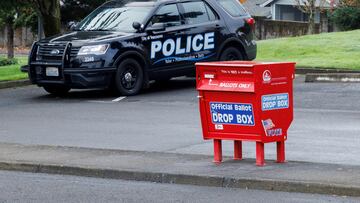What happens to your mail-in ballot after it’s sent? Journey from drop off until it’s counted
The journey your mail-in ballot will go on after you return it through election day.


Millions of voters will opt to cast their ballots by mail rather than heading to a polling place to vote early or on election day. But what happens to these ballots once they are mailed? Where do they go? Are they counted before election day? How is the chain of custody maintained?
Firstly, all states allow mail-in voting in some capacity. Several states send all voters a ballot that can be returned by mail, others allow voters to request one without providing an excuse, and others will only allow mail-in ballots to be cast by those who require them for a specific reason (i.e., they will be out of the country during the election). While the processes vary from state to state, since these governments have the authority to determine how elections will be run, there are some broad similarities.
It has been 12 days since I cast my early ballot! You can join me in voting early, by mail or in person. Log on to https://t.co/MkqfgUIWzg to request a ballot-by-mail or to find a voting location. pic.twitter.com/TERjjX1uzQ
— Arizona Secretary of State (@AZSecretary) October 21, 2024
Most states rely on the postal service, a public entity, to support the facilitation of mail-in voting. A postal worker will deliver the ballot to one’s home. Once the ballot has been filled up, sealed, and signed, it must be returned. Depending on the state, one can return it to the post office or drop box (sometimes these are established during the election, especially for collecting ballots), a drop box, or an election office.
Signatures and ballot curing
Related stories

Kamala Harris' view on building the border wall

Why are Republicans red and Democrats blue?
Then, election officials will be tasked with ensuring that the ballots are in a condition that allows them to be counted. This means that the envelope is intact and critical and that the signature on the ballot matches the voter registration documents. Ballot curing is a process undertaken in most states to support the authentication process. If a ballot is missing a signature or the signature does not match, the voter will be contacted and allowed to rectify the situation, usually by heading to their local election office.
Read more from AS USA:
- Tax season 2025: what are the federal tax brackets for next year?
- 8 million student loan borrowers will see their repayment frozen for the next 6 months: find out if you are one of them
- Goodbye to Social Security checks in 2031? This is what some experts say will happen if Trump wins
- Barron Trump isn’t your regular university student: Trump’s youngest son lives with mom and dad in New York
Ballot processing and counting
Not all states allow election officials to process ballots and count them before election day. In those states, the ballots will be cured and kept in a secure location where they will not be touched until the polls close and counters can begin the tabulation. However, in more than half of US states, processing can begin before election day, which allows the results to be announced faster on election night. According to the National Conference of State Legislatures, Arizona enables election officials to start processing and counting the ballots once received. However, in Idaho and several other states, the counting cannot begin until after polling locations have closed.
Complete your personal details to comment